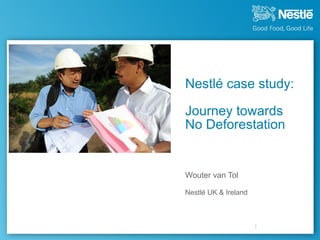
No Deforestation Chatham House 060712
- 1. Nestlé case study: Journey towards No Deforestation Wouter van Tol Nestlé UK & Ireland
- 2. Nutrition, Health & Wellness 1bn customers per day 120 countries Sales CHF 83bn 280,000 employees 2
- 3. Palm oil: a small commodity for Nestlé, but high profile due to the deforestation issue 3
- 4. Nestlé’s No Deforestation commitment Biodiversity • Destruction of tropical rainforests and peatlands to cultivate crops such as palm oil is one of the most serious environmental issues facing us today. • Estimate: rainforest destruction contributes to around 20% of greenhouse gas emissions. Biofuels are a significant factor. Action taken in 2010 • Commitment to ensure that our products do not have a deforestation impact • Partnership with The Forest Trust (TFT) to eliminate deforestation from our supply chain. 4
- 6. Proactively intervening in the supply chain • Base: RSPO certificationMapping Supply Chain • In addition: active intervention with TFT for traceability and protection of High Carbon Stock and peatlands … and Supporting our Suppliers 6
- 7. Examples of challenges Management Tools Overlaying our supply chain with maps of where deforestation is happening and where it will be going next Definitions of deforestation E.g. if definition is 30% canopy cover, what action to take when? • If canopy cover 30%29%? • If canopy cover 100% 30%? 7
- 8. In summary • Deforestation is an important issue for a consumer goods company like Nestlé • Nestlé actively intervenes in the supply chain based on Responsible Sourcing Guidelines (for cross-cutting issues and specific categories) • Working closely with suppliers to make them part of the transformation process • Many challenges ahead, but we are making progress 8
Notes de l'éditeur
- Thank Chair + short introduction
- CHF 83.6bn = GBP 56bn
- We buy 10% of the world’s supply of milk, coffee and cocoa, and only 0.7% of palm oil. Nestlé thought it was a small player. Yet that is still a large amount in the absolute. Whilst Nestlé was engaged in the issue via stakeholder round tables and had a policy in place to improve the sourcing, this was not enough. We had not rid our supply chains from unacceptable supplies. So Nestlé got a little wake up call courtesy of Greenpeace, focused on our supplier GAR.
- We created a clear position. Nestlé views the destruction of tropical rainforests and peatlands to cultivate crops such as palm oil as one of the most serious environmental issues facing us today. It is estimated that rainforest destruction contributes to around 20% of greenhouse gas emissions and the growing use of biofuels is a significant factor. We took action. In 2010, we made a commitment to ensure that our products do not have a deforestation impact. We also announced a partnership with The Forest Trust (TFT) to eliminate deforestation from our supply chain. To our knowledge Nestle was the first food company to explicitly commit to stop deforestation through our commodity supply chains. We were also the first company to focus on saving peat land and forests with high carbon value. This position applies to all commodities - 8 of the 12 priority commodities are affected.
- Out of these 12 commodities, the ones most associated with deforestation are palm oil, pulp & paper, soya and meat. Deforestation is not the prime concern for coffee, cocoa, dairy and shea, but deforestation occurs nonetheless.
- Our approach more than writing policy or relying on certification. It is “interventionist”, proactive, i.e. we are putting people on the ground, getting our hands dirty sorting out the supply chains and supporting our suppliers. Our aim is to achieve full traceability in our supply chains.